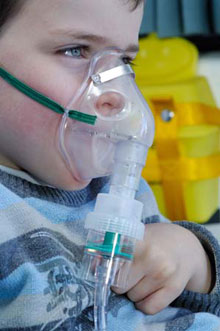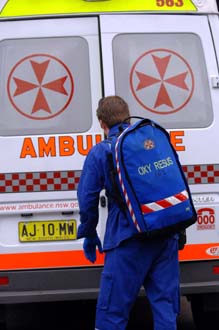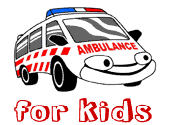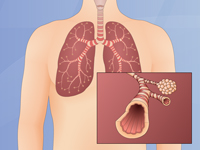Over 2 million Australians have been diagnosed with asthma and each year it directly causes more than 300 deaths. It is an unpredictable disease that affects the airways in the lungs. When exposed to certain “triggers” the muscles that wrap around the airways tighten, making the airways narrower, and it becomes more difficult to breathe.
This narrowing is called “bronchospasm” and is part of a natural reflex to protect the lungs from contaminants, but in people with asthma the reflex is much more severe. It is usually caused by allergens such as dust, pollens, drugs or foods, but in some people with asthma it can be triggered by infection, exercise or cold air. The reflex that causes the bronchospasm also causes cells that line the airways to produce more phlegm, and this can block the narrowed airways, leading to more breathing difficulties.
Asthma can be diagnosed any time after one year of age and is usually detected by a persistent dry cough, particularly at night, in the early morning or with exercise. It is usually accompanied with shortness of breath and a wheeze. It is especially difficult to predict the severity of attacks in children because their airways change as they grow and their sensitivity to “trigger factors” can change.
Frequently Asked Questions

What makes the airways narrow?
There are three main factors the cause airways to become narrow:
- The inside lining of the airways becomes red and swollen (inflammation).
- Extra mucus (sticky fluid) may be produced
- The muscle around the airways tighten(bronchoconstriction)
How do you recognise Asthma?
- A dry, irritating, persistent cough, particularly at night, early morning, with exercise or activity
- Chest tightness
- Shortness of breath
- Wheeze
What triggers Asthma?
Once someone has asthma, symptoms are set off or made worse by “triggers”. These can include:
- Colds and flu
- Cigarette smoke
- Exposure to cigarette smoke (passive smoking)
- Exercise
- Inhaled allergens (eg pollens, moulds, animal dander and dust mites)
- Environmental factors (eg dust, pollution, woodsmoke, bush fires)
- Changes in temperature and weather
- Certain medications (eg aspirin)
- Chemicals and strong smells (eg perfumes, cleaners)
- Emotional factors (eg laughter, stress)
- Some foods and food preservatives, flavourings and colourings (uncommon)
Every person’s asthma is different. Not all people have the same triggers, nor will they react to all those in the above list. You may not always know what triggers your asthma, but it is helpful to identify the triggers in order to avoid them. Your doctor may be able to help you identify your triggers.
Does Asthma get better or worse with time?

People with asthma usually have attacks when a “trigger” causes a sudden increase in bronchospasm and shortness of breath, but most people with asthma usually have mild symptoms even between attacks. Recent research has shown that just these mild symptoms can change the airways: strengthening the muscle and making more mucous cells. With these changes there is a risk that the next “attack” could be much more severe, and you should let your doctor know if you have even mild asthma symptoms or are needing to use your reliever daily. New medications can reduce these mild symptoms and slow the changes in your airways.
What happens after Asthma is diagnosed?
A detailed medical history combined with the symptoms of asthma may be enough for your doctor to start you on asthma medications. Your doctor may also conduct respiratory function tests (to see how much air your can move in and out of your lungs) and send you to a allergy specialist to try to identify your “triggers”.
Most Asthma medications have no serious side effects and do not lose their potency over time, so it’s wise to start the medication even before the tests are completed. Your doctor will also help you make an Asthma Plan so you can manage your asthma if your symptoms get worse.
For further information
For more information talk to your doctor, or contact
The Asthma Foundation of NSW
Toll Free Helpline 1800 645 130
|
|

